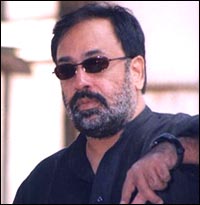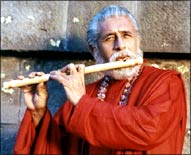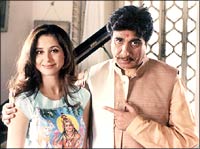" It's very cliched to say that Banaras is a mystic love story, that it's really different, that I've attempted something new with the film. Almost as bad as calling it very hatke.
It's very cliched to say that Banaras is a mystic love story, that it's really different, that I've attempted something new with the film. Almost as bad as calling it very hatke.
What can I say? It's a pretty movie, pretty looking.
Yesterday, at the Lucknow press conference, they asked me if technique is necessary in filmmaking. I said you may call it 'technique' but, for me, it's the way of making movies. That is what I do. Film Information said I was ahead of my time. I asked them what their concept of time was, but they didn't answer.
I find that most journalists aren't going into depth; instead of going into the answer, they jump to the next question. They aren't listening when you're talking.
There are so many mediapersons for whom it's just a job, which is not very good because there is a lack of intelligent journalists. I might get into hot water for saying this, but then so what? I'm hoping that somewhere they don't treat interpreting my film as just a job, because for me it wasn't a job. It was not just making a movie.
 I'm hoping people apply their minds with this film, and think about what they have to write. Seeing what happens when the 300 reviews come out on Friday is also going to be an adventure. Because this is radically different from anything I've done. And this is a first step. I'm going to do more of this. That's a threat and that's a promise!
I'm hoping people apply their minds with this film, and think about what they have to write. Seeing what happens when the 300 reviews come out on Friday is also going to be an adventure. Because this is radically different from anything I've done. And this is a first step. I'm going to do more of this. That's a threat and that's a promise!
I was 19 while studying at the Film Institute, and I had a film background. I come from possibly the most filmi street in Bollywood -- with everyone from directors Ramesh Sippy and (now) Ashutosh Gowariker, (composers) Anand-Milind, (composer) Chitragupt, (director) Devendra Goel, Manoj Kumar, Cuckoo the dancer (mentor to Helen) ... all living here! My father worked with Guru Dutt and Navketan films. I was immersed in cinema.
But then came FTII. When you get there, they rip your mind open -- if you want to do it, that is. You can also sit under a tree, drink bad liquor, come back to Mumbai and not make movies; you become a journalist. Which isn't fair because you're wasting another student's seat. There are all kinds of cinema. 10,000 different kinds running through your head when you come out of the institute.
Before I came out, I made a comedy as my passing out film, which stood first, and I won a gold medal. You have to make two 20-minute movies: fiction and a documentary. The fiction was sheer, outright comedy, a prerequisite to Jaane Bhi Do Yaaron, I suppose -- made in the same style, before it was made.. and it also starred Satish Shah! Wacky as hell!
The documentary was a serious black-and-white film on a mental hospital. It got me a Filmfare Award. A student film was nominated in a professional arena, along with the work of directors like (Shyam) Benegal, and yet it stood out and I won. It then went to festivals all over the place.
So, I was doing radically different cinema back at the Institute, and it paid off. But when you come to Mumbai and narrate a serious story to people, they turn away. I didn't want to do serious cinema, but it was always at the back of my mind. I constantly made documentaries: girl-child killings, a 1000-year old snake god festival in Rajasthan, a documentary on enlightenment down South last year. I also made lots of corporate films for companies like Tata Consultancy Services and others.
While working with TCS, I met L C Singh, who gave me informative films to make, which could possibly be thought of as boring in a sense. When he changed the company, I made more films for him. He was very passionate about films, and great fun. He was from the Banaras Hindu University. One day, he told me he wanted to make a movie and put his money in it. And he gave me the story.
He wrote the story himself! And very bashfully, I must add. He was a corporate guy, and big; when he quit TCS, The Economic Times headline was: 'Czar of infotech quits TCS', and I don't think there can be a bigger salutation. He's a pioneer; a legend in his own field. So he brought me this script, and I expected it to be either clerical or pedantic or very esoteric, but it blew me away. I told him, it's great, let's go.
 Developing that was tough. Writing a comedy is easy because there's a story to it, but here you are writing about what you think of life, how you interpret life. Your own personality comes into it, and no two personalities are the same. So we clashed. When we brought in Javed Siddiqui, we clashed some more, because he had his own ideas. But it was beautiful. Writing itself was beautiful, which was the difficult part. To decide how far to go.
Developing that was tough. Writing a comedy is easy because there's a story to it, but here you are writing about what you think of life, how you interpret life. Your own personality comes into it, and no two personalities are the same. So we clashed. When we brought in Javed Siddiqui, we clashed some more, because he had his own ideas. But it was beautiful. Writing itself was beautiful, which was the difficult part. To decide how far to go.
At the end of the day, money was involved. Not my money, his money. My reputation, I suppose. And, to top it all, my last film hadn't done well. I got a lot of brickbats. After that, instead of a safe choice like a typical happy comedy, I decided to be brave and do this. If God has given you talent, you might as well go on the front foot and try to hit a six. It doesn't matter if I get gaalis again. So, I went ahead and did it. I deserve full marks, I think, for going out there and doing it.
I'm very happy with Banaras. No matter what happens when it releases, I'm very proud and happy about the film I've made.
Don't miss: Part Two: 'It's a very emotional film'
As told to Raja Sen.






 © 2025
© 2025